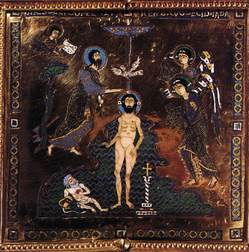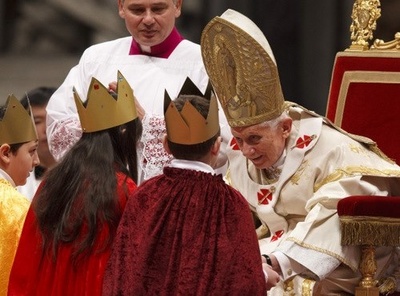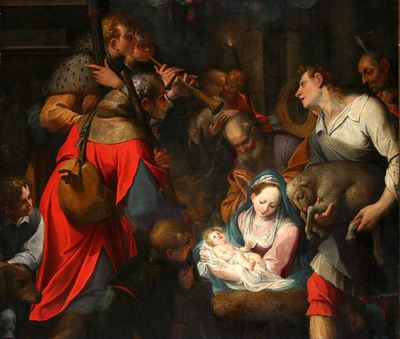An annual tradition on the Feast of the Baptism of the Lord is the baptism of the children by the Pope in the Sistine Chapel. Today, Benedict baptized 20 children. This is the same place where the cardinals meet under lock and key to elect a new pontiff. Here is the pope's teaching.

The joy arising from the celebration of Christmas finds its completion today in the Feast of the Baptism of the Lord. To this joy is added another reason for those of us who are gathered here: in the Sacrament of Baptism that will soon be administered to these infants, the living and active presence of the Holy Spirit is manifested, enriching the Church with new children, enlivening and making them grow, and we cannot help but rejoice. I wish to extend a special greeting to you, dear parents and godparents, who today bear witness to your faith by requesting Baptism for these children, because they are regenerated to new life in Christ and become part of the community of believers.
The Gospel account of Jesus' baptism, which we have heard today according to St Luke's account, shows the path of abasement and humility that the Son of God freely chose in order to adhere to the plan of the Father, to be obedient to His loving will for mankind in all things, even to the sacrifice on the Cross. Having reached adulthood, Jesus begins His public ministry by going to the River Jordan to receive from John the baptism of repentance and conversion. What happens may appear paradoxical to our eyes. Does Jesus need repentance and conversion? Of course not. Yet He Who is without sin is placed among the sinners to be baptized, to fulfil this act of repentance; the Holy One of God joins those who recognize in themselves the need for forgiveness and ask God for the gift of conversion - that is, the grace to turn to Him with their whole heart, to be totally His. Jesus wills to put Himself on the side of sinners, by being in solidarity with them, expressing the nearness of God. Jesus shows solidarity with us, with our effort to convert, to leave behind our selfishness, to detach ourselves from our sins, saying to us that if we accept Him into our lives, He is able to raise us up and lead us the heights of God the Father. And this solidarity of Jesus is not, so to speak, a mere exercise of the mind and will. Jesus was really immersed in our human condition; He lived it to the utmost - although without sin - and in such a way that He understands weakness and fragility. Therefore He is moved to compassion; He chooses to "suffer with" men, to be penitent together with us. This is the work of God that Jesus wishes to accomplish: the divine mission to heal those who are wounded and to cure those who are sick, to take upon Himself the sin of the world.

















